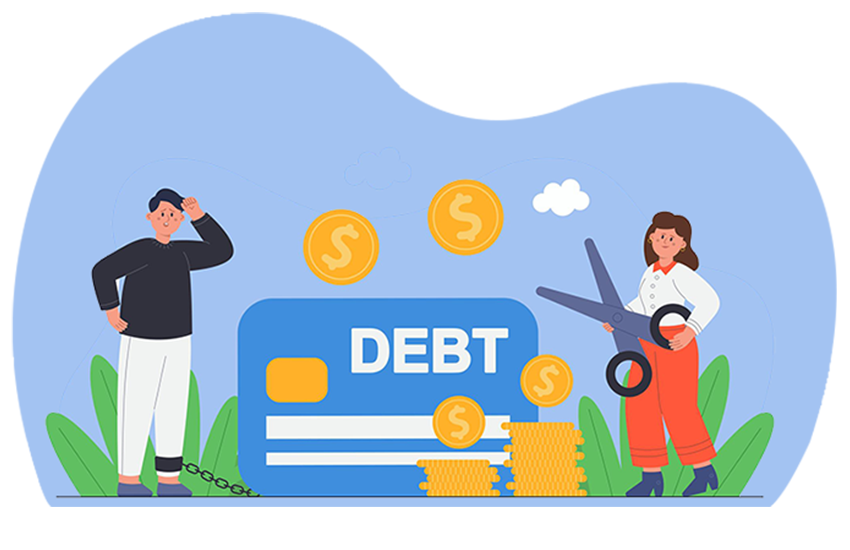
 The topic of whether debt consolidation hurts one’s credit rating has long been a subject of debate. While debt consolidation can offer a variety of benefits, including simplifying repayment and possibly reducing interest rates, its impact on credit scores is a critical consideration. As a Canadian struggling to pay off debts and aiming to comprehend the complexities of debt relief BC, it is crucial to delve into the intricacies involved.
The topic of whether debt consolidation hurts one’s credit rating has long been a subject of debate. While debt consolidation can offer a variety of benefits, including simplifying repayment and possibly reducing interest rates, its impact on credit scores is a critical consideration. As a Canadian struggling to pay off debts and aiming to comprehend the complexities of debt relief BC, it is crucial to delve into the intricacies involved.
To understand the effects of debt consolidation on credit ratings, we need to first grasp the basic concept. Debt consolidation involves taking out a new loan to pay off multiple existing debts. This process aims to streamline repayment by combining debts into a single monthly payment. It is important to note that while debt consolidation itself does not directly harm credit ratings, certain factors associated with the process might have an impact.
One of the potential drawbacks of debt consolidation is the impact it may have on credit utilization. Credit utilization refers to the percentage of available credit that a person is currently using. Consolidating debt often involves closing previous accounts, which can reduce the overall credit limit. As a result, this may increase credit utilization, potentially leading to a decrease in credit scores. College students must be aware of this impact and consider alternatives to mitigate any negative consequences.
Additionally, debt consolidation may negatively affect credit ratings if not approached cautiously. Applying for new loans or credit during the debt consolidation process can result in multiple hard inquiries. These inquiries are recorded on credit reports and can lower credit scores. Thus, college students must exercise prudence and restrain from seeking additional credit while consolidating their debts.
On the other hand, debt consolidation can also positively impact credit ratings if managed wisely. By consolidating debts and making consistent on-time payments toward the newly acquired loan, individuals demonstrate responsible financial behaviour. This display of reliability to lenders can lead to a gradual improvement in credit scores. College students should perceive debt consolidation as an opportunity to rebuild their credit as long as they adhere to appropriate financial management practices.
Another aspect to consider is the impact on credit history length. Closing old accounts while consolidating debt can impact the length of one’s credit history. Credit history length is a vital factor when determining creditworthiness. Generally, a longer credit history is seen as more favourable than a shorter one, as it provides a more comprehensive picture of an individual’s financial behaviour. However, in some circumstances, it may be necessary to close accounts to achieve debt consolidation goals. College students must weigh the pros and cons of closing accounts to minimize potential adverse effects.
Furthermore, the type of debt consolidation strategy employed may also influence credit ratings. Two common approaches to debt consolidation are debt management programs and personal loans. Debt management programs involve working with credit counselling agencies to negotiate payment plans with creditors. While enrolled in such programs, credit reports may indicate participation, which could impact credit scores. However, completing the program successfully can positively impact credit ratings. Conversely, personal loans used for consolidation might not have an immediate impact but carrying both old and new debts could be detrimental to credit ratings if not managed responsibly.
Lastly, college students should recognize that debt consolidation alone does not determine credit ratings. Credit scores are determined by a range of factors, including payment history, amounts owed, credit history length, types of credit used, and new credit. Debt consolidation may have a temporary negative impact on some factors but can ultimately contribute to long-term positive effects when managed correctly.
In conclusion, the impact of debt consolidation on credit ratings is a complex issue that requires careful consideration. While debt consolidation itself does not directly harm credit ratings, aspects such as credit utilization, hard inquiries, credit history length, and the type of consolidation strategy employed can have an impact. College students seeking to make informed decisions on debt consolidation must weigh the potential benefits against possible drawbacks, considering their individual financial situation. It is crucial to approach debt consolidation cautiously, adhering to responsible financial management practices to minimize any negative effects and potentially rebuild credit in the long run.





